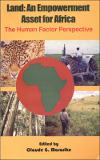| dc.contributor.author | Mangena, Fainos | |
| dc.coverage.spatial | Zimbabwe. | en |
| dc.date.accessioned | 2016-04-22T13:20:51Z | |
| dc.date.available | 2016-04-22T13:20:51Z | |
| dc.date.issued | 2014 | |
| dc.identifier.citation | Mangena, F. (2014) The ethics behind the fast-track land reform programme in Zimbabwe. In: Mararike, C.G. (ed.) Land: an empowerment asset for Africa: the human factor perspective. Harare: UZ Publication, pp. 82-95. | en |
| dc.identifier.isbn | 978-1-77920-110-2 | |
| dc.identifier.uri | https://opendocs.ids.ac.uk/opendocs/handle/20.500.12413/11339 | |
| dc.description | A position paper on the ethical perspective of Zimbabwe government's land reform programmes. | en |
| dc.description.abstract | A lot has been written about the Fast Track Land Reform Programme (FTLRP) in Zimbabwe. Since 2000, there have been critical academic contributions from the humanities, social sciences, life-sciences as well as the natural sciences on this highly emotive subject. While most contributors have focused on the socio-economic and political dynamics of the FTLRP, and while most contributors have blamed the government of Zimbabwe for what they have perceived as injustices perpetrated against a remnant of the white commercial farmers who owned the biggest chunk of the land, we look at the ethical dynamics of the FTLRP with a view to show that the government of Zimbabwe was justified in taking land from these white commercial farmers and giving it to the landless blacks.
In our view, the government of Zimbabwe was justified for two reasons: Firstly, we argue that those who have blatantly criticised the government of Zimbabwe for being unjust in its re-distribution of land to the landless blacks have selective memory. Secondly, we argue that those who have blamed the government on this issue have little knowledge of the spirit and ethics that informed this drive. As we defend our argument, we utilise two dialectically opposed perspectives, namely: the human rights perspective which is made up mainly of those people who have criticized the FTLRP for violating or infringing the rights of the few white commercial farmers ‘whose’ land was taken by the landless blacks as well as the perspective of those who have defended the FTLRP for correcting a historical imbalance with regard to the re-distribution of fertile /and to the black majority. We discuss these two perspectives in the context of Zimbabwe’s founding values and ethics. | en |
| dc.language.iso | en | en |
| dc.publisher | University of Zimbabwe (UZ) Publications | en |
| dc.rights.uri | http://creativecommons.org/licenses/by-nc-nd/3.0/ | en |
| dc.subject | Economic Development | en |
| dc.subject | Rights | en |
| dc.title | The ethics behind the fast-track land reform programme in Zimbabwe | en |
| dc.type | Book chapter | en |
| dc.rights.holder | University of Zimbabwe (UZ) | en |


